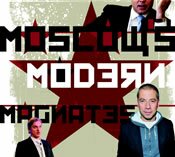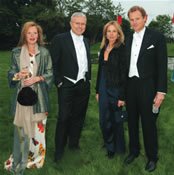Inflight Magazine of Brussels Airlines
Welcome to the Inflight Magazine of Brussels Airlines
Moscow’s modern magnates
With the Russian economy collapsing, the Cristal-spraying billionaire suddenly seems outmoded, if not out of order. Boyd Farrow investigates the new breed of entrepreneurs
Images Getty Images
 Although he refers to himself modestly on his LiveJournal blog as a “socially responsible potato farmer”, it’s far harder for an observer to label Alexander Lebedev. The Russian billionaire has beguiled the British media since buying a 75.1% stake in the flailing newspaper London Evening Standard in January. In 2008, he was Russia’s 39th richest man according to Forbes, worth around €2.5bn, which he earned from his stakes in agriculture, airlines, media and energy companies. Oh, and he also used to be a KGB spy – based in London, where he gleaned information about the capitalist west from the pages of the Standard.
Although he refers to himself modestly on his LiveJournal blog as a “socially responsible potato farmer”, it’s far harder for an observer to label Alexander Lebedev. The Russian billionaire has beguiled the British media since buying a 75.1% stake in the flailing newspaper London Evening Standard in January. In 2008, he was Russia’s 39th richest man according to Forbes, worth around €2.5bn, which he earned from his stakes in agriculture, airlines, media and energy companies. Oh, and he also used to be a KGB spy – based in London, where he gleaned information about the capitalist west from the pages of the Standard.
Unlike most Russian oligarchs, such as Chelsea FC’s saviour Roman Abramovich or Naomi Campbell’s beau Mikhail Prokhorov, who made their fortunes through the murky privatisation of natural resources, Lebedev earned his through banking. His first company, Russian Investment-Finance Company, bought the weedy National Reserve in 1995 and turned it into one of Russia’s biggest banks. Indeed, the 49-year-old paints himself as a “capitalist-idealist” and is keen to distance himself from other post-glasnost billionaires.
Instead Lebedev has used his riches to carve out a career as a philanthropist and independent politician. In 2006, he teamed up with close friend and former Soviet leader Mikhail Gorbachev to buy stakes of 39% and 10% respectively in the liberal newspaper Novaya Gazeta. When journalist and Kremlin critic Anna Politkovskaya was murdered, Lebedev offered a RUB 25m (€550,000) reward for information leading to the arrest of the person responsible.
 As with the Evening Standard, Lebedev stressed at the time of purchase of Novaya Gazeta that he wasn’t interested in the paper for political reasons. Rather, it was his “contribution to building civil society”. Lebedev created the Charitable Reserve Fund and over the past three summers has hosted a high-society ball in the UK for the Raisa Gorbachev Foundation, which raises money primarily for Russian cancer charities. “There are so many organisations you can help with your money, rather than just buying things,” he has said.
As with the Evening Standard, Lebedev stressed at the time of purchase of Novaya Gazeta that he wasn’t interested in the paper for political reasons. Rather, it was his “contribution to building civil society”. Lebedev created the Charitable Reserve Fund and over the past three summers has hosted a high-society ball in the UK for the Raisa Gorbachev Foundation, which raises money primarily for Russian cancer charities. “There are so many organisations you can help with your money, rather than just buying things,” he has said.
Although clearly well connected, Lebedev’s newly raised international profile emphasises that you don’t always have to be a government-made magnate or controversy magnet to succeed in Russian business. Self-made millionaires include 30-year-old Maxim Nogotkov, founder of Maxus and its Svyaznoy chain of mobile phone retail stores; Ruben Dishdishyan, whose Central Partnership has become one of the country’s leading film producers; and Arkady Novikov, Russia’s so-called ‘blini baron’, who has more than 50 restaurants and plans openings in London and Milan. Meanwhile, Oleg Beriev has taken his Moscow brand consultancy, Mildberry, global by opening offices in London, Milan and Dubai.
Flying under the radar
One of Russia’s most low-key billionaires is 47-year-old physicist-turned-banker Yuri Milner, whose Moscow-based Digital Sky Technologies (DST) recently paid €141.6m for 2% of the social networking site Facebook and offered to buy up to $100m (€71m) in shares from employees. While virtually unknown outside Russia until May, DST has amassed $1bn (€707m) worth of stakes in 30 companies across eastern Europe, including Russia’s most popular website Mail.ru, Astrum Online Entertainment, the largest developer and operator of online games in Russia, and OE Investments, the largest Russian operator of electronic payments.
 Milner studied particle physics at Moscow State University and worked as a researcher at the Soviet Union’s Academy of Sciences. As the Soviet Union began to unravel in 1990, “instead of sticking around and doing useful stuff like privatising oil companies, I went to the US to study”, he joked at a technology conference in California in May. He became the first Russian graduate of the Wharton School of Business, after which he spent three years at the World Bank working on Russia’s emerging financial sector. After two years working in private equity – buying and selling Extra M, the largest Russian maker of macaroni – he read some internet research by the Morgan Stanley analyst Mary Meeker and fixed on the idea of starting Russian versions of Yahoo!, eBay and Amazon. In May, Milner told Slon.ru that he envisages floating DST – whose shareholders, incidentally, include Arsenal football club shareholder Alisher Usmanov – within three years.
Milner studied particle physics at Moscow State University and worked as a researcher at the Soviet Union’s Academy of Sciences. As the Soviet Union began to unravel in 1990, “instead of sticking around and doing useful stuff like privatising oil companies, I went to the US to study”, he joked at a technology conference in California in May. He became the first Russian graduate of the Wharton School of Business, after which he spent three years at the World Bank working on Russia’s emerging financial sector. After two years working in private equity – buying and selling Extra M, the largest Russian maker of macaroni – he read some internet research by the Morgan Stanley analyst Mary Meeker and fixed on the idea of starting Russian versions of Yahoo!, eBay and Amazon. In May, Milner told Slon.ru that he envisages floating DST – whose shareholders, incidentally, include Arsenal football club shareholder Alisher Usmanov – within three years.
Milner isn’t the only Russian scientist-turned-entrepreneur anticipating a massive windfall from new technology. In 1998, Dmitry Kotenko, a 38-year-old former student at Moscow’s Baumann Technical Institute, decided to ditch the lab coat for the more lucrative world of business. He set about transforming an old chemical factory in Siberia into a major producer of trichlorosilane, a key ingredient in polysilicon for solar panels and named his new company Nitol.
Cut to 2009 and Nitol is a billion-dollar success story at the vanguard of one of the world’s most dynamic industries. Now called Nitol Solar, the company is Russia’s largest producer of polysilicon, the basic raw material used to make solar panels that turn sunlight into electricity. Alternative energy is emerging as an area in which Russia has high hopes of carving out an international niche. In June, the Russian Nanotechnology Corporation joined with leading industrial conglomerate Renova and Swiss engineering firm Oerlikon to build a $630m (€445m) solar cell plant in the central Russian town of Novocheboksarsk, one of a dozen solar-related projects currently being expanded by Russian companies.
Living life in the fast lane
But some self-made billionaires are more happy to just sit in the sun. Siberian-born Oleg Tinkov, who began his business career in 1993 with a group of consumer electronics stores that he sold in 1997 for $7m (€5m), made his wealth with a chain of beer restaurants and a beer brewery business. In early 2006, he launched the credit-card only bank Tinkoff Credit Systems. If Tinkov is ever seen with a supermodel it’s probably Natalia Vodianova, whose Naked Heart Foundation he donates money to. And he’s far more likely to be seen on a racing bike than in the back of a bullet-proof limo – until this year, he sponsored the Russian team in the Tour de France.
“We have so many problems in Russia… I don’t understand why Russians get so excited about Roman Abramovich buying a new yacht,” Tinkov recently told an investment conference in Moscow. It now seems that level of excitement is waning – the Kremlin has reportedly advised oligarchs to tone down the bling. The conference’s most popular sentiment was expressed by Ruben Vardanyan, head of Troika Dialog brokerage and investment firm: the spirit of entrepreneurship, he noted, is “to dream about more than money”.
FR Les magnats moscovites à l’heure de la modernisation
Alors que l’ancienne oligarchie russe décline, l’archétype du milliardaire excentrique et flambeur bat de l’aile pour faire place à une nouvelle génération d’hommes d’affaires plus mesurés, nous explique Boyd Farrow
Rien n’est plus difficile que de mettre une étiquette sur Alexander Lebedev. Celui qui se désigne comme un ‘producteur de pommes de terre socialement responsable’, ex-agent du KGB, détenteur de participations dans des sociétés agricoles, des compagnies aériennes, des media et des géants de l’énergie, est aussi le nouveau propriétaire du quotidien d’outre-Manche le London Evening Standard. Il tient toutefois à se différencier de l’univers cloîtré des super-riches de la période post-Glasnost, en plaçant ses avoirs dans la presse indépendante et notamment dans le tabloïd anti-conformiste Novaya Gazeta, en offrant une récompense de € pour toute information susceptible d’arrêter la personne coupable de l’assassinat de la journaliste – critique vis-à-vis du Kremlin- Anna Politkovskaya, et en levant des fonds pour des œuvres de soutien aux malades du cancer. À ses yeux, “il existe tellement d’organisations à aider lorsque l’on a de l’argent, au lieu de le dépenser bêtement.”
Pour percer dans les affaires en Russie, il n’est pas toujours nécessaire d’avoir ses entrées dans les milieux proches du pouvoir ou d’être un contestataire influent. La preuve : nombre de jeunes milliardaires sont partis de zéro comme Maxim Nogotkov, 30 ans, créateur de Maxus, Svyaznoi à la tête d’une chaîne de distribution de téléphones mobiles, Ruben Dishdishyan, dont ‘Central Partnership’ est devenu l’une des plus grandes sociétés de production de films du pays, Arkady Novikov, le ‘roi des blinis’ et Oleg Beriev dont l’agence de design Mildberry est en train d’ouvrir des succursales à Londres, Milan et Dubaï.
Certains ont un profil plutôt discret, comme Yuri Milner, 47 ans, un physicien devenu financier, qui a récemment acheté 2% de Facebook et qui possède des actions dans Mail.ru, Astrum Online Entertainment et OE Investments.
Mais Milner n’est pas le seul scientifique russe devenu entrepreneur à avoir anticipé les retombées massives des nouvelles technologies. En 1998, Dmitry Kotenko a troqué son tablier de laboratoire contre une tenue plus lucrative de businessman. Sa compagnie Nitol est aujourd’hui le plus grand producteur en Russie de polysilicone, un matériau qui entre dans la fabrication des panneaux solaires.
Finalement, les oligarques de l’ancien système en Russie ont fini par perdre de leur aura ; le Kremlin leur a demandé récemment de modérer leurs trains de vie ostentatoires. Comme Ruben Vardanyan, chef de la firme Troika Dialog investment l’a si bien dit : “L’esprit d’entreprise c’est d’abord le rêve plus que l’argent.”
NL Moderniserende Magnaten in Moskou
Nu het oude regime in Rusland aan het tanen is, lijkt het clichébeeld van de Cristalzwelgende miljardair achterhaald. De tijd van de nieuwe, discretere oligarchen is aangebroken, zegt Boyd Farrow
Het is moeilijk om Alexander Lebedev te definiëren. Hij noemt zichzelf een ‘sociaal verantwoordelijke aardappelteler’ maar de voormalige spion voor de KGB, die aandelen heeft in landbouw, vliegtuigmaatschappijen, media- en energiebedrijven, is de nieuwe eigenaar van de Britse krant London Evening Standard. Hij neemt elke kans ter harte om zich te distantiëren van andere post-Glasnost miljardairs. Hij wendde zijn rijkdom aan om zich in te kopen in de liberale krant Novaya Gazeta, hij loofde een beloning van € 588.000 uit voor informatie die zou leiden tot de arrestatie van de persoon die Anna Politkovskaya had vermoord, die kritiek had geuit op het Kremlin, en hij zamelt geld in ten voordele van Russische organisaties voor kankerbestrijding. Hij zegt: “Er zijn zoveel organisaties die je kan helpen door ze jouw geld te schenken, in plaats van er andere dingen mee te kopen”.
Je hoeft blijkbaar geen magnaat te zijn met een verleden in de regering of een controversieel figuur om succes te hebben in de Russische zakenwereld. Het beste bewijs? Self-made miljonairs als de 30-jarige Maxim Nogotkov, de oprichter van Maxus en zijn reeks Svyaznoi verkooppunten voor gsm’s; Ruben Dishdishyan, wiens Central Partnership een van de toonaangevende filmproductiemaatschappijen van het land geworden is; Arkady Novikov, de Russische ‘blinibaron’; en Oleg Beriev die met zijn bedrijf Mildberry (gespecialiseerd in brand consultancy) kantoren opent in Londen, Milaan en Dubai.
Een van de meest discrete miljardairs van Rusland is de 47-jarige Yuri Milner, een natuurkundige die bankier werd. Hij kocht recent 2% van Facebook en heeft aandelen in Mail.ru, Astrum Online Entertainment en OE Investments.
Milner is niet de enige Russische wetenschapper annex ondernemer die een fortuinlijke toekomst voorspelt voor nieuwe technologie. In 1998 hing Dmitry Kotenko zijn labojas aan de kapstok om zijn geluk te gaan beproeven in de meer lucratieve zakenwereld. Zijn bedrijf, Nitol, is nu de grootste producent van polisiliconen, een stof die gebruikt wordt voor de productie van zonnepanelen.
De liefde van Rusland voor zijn oligarchen van weleer lijkt stilaan te verwateren; het Kremlin waarschuwde hen onlangs nog om hun rijkdom niet te opzichtig tentoon te spreiden. Ruben Verdanyan, de topman van de beleggingsmaatschappij Troika Dialog, verwoordt het als volgt: “Dromen van meer dan geld alleen, dat is de geest van ondernemerschap”.
Leave a Reply
